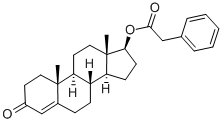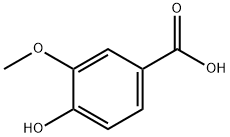4-Hydroxy-3-methoxyphenylacetic Acid , >98.0%(HPLC) , 306-08-1
Synonym(s):
4-Hydroxy-3-methoxyphenylacetic acid;HVA
CAS NO.:306-08-1
Empirical Formula: C9H10O4
Molecular Weight: 182.17
MDL number: MFCD00004350
EINECS: 206-176-7
| Pack Size | Price | Stock | Quantity |
| 250MG | RMB47.20 | In Stock |
|
| 1G | RMB84.80 | In Stock |
|
| 5G | RMB356.00 | In Stock |
|
| 25G | RMB1672.00 | In Stock |
|
| others | Enquire |
PRODUCT Properties
| Melting point: | 142-145 °C(lit.) |
| Boiling point: | 235.56°C (rough estimate) |
| Density | 1.1634 (rough estimate) |
| refractive index | 1.4209 (estimate) |
| storage temp. | Keep in dark place,Inert atmosphere,Room temperature |
| solubility | DMSO (Slightly), Methanol (Slightly, Heated) |
| form | Crystalline Powder |
| pka | 4.39±0.10(Predicted) |
| color | White to beige |
| Water Solubility | soluble |
| Merck | 14,4740 |
| BRN | 2213447 |
| Stability: | Hygroscopic |
| LogP | 0.330 |
| CAS DataBase Reference | 306-08-1(CAS DataBase Reference) |
| NIST Chemistry Reference | Benzeneacetic acid, 4-hydroxy-3-methoxy-(306-08-1) |
| EPA Substance Registry System | Homovanillic acid (306-08-1) |
Description and Uses
Homovanillic acid (HVA) is a dopamine metabolite. It is formed via deamination of dopamine by monoamine oxidase (MAO) to produce 3,4-dihydroxyphenylacetic acid (DOPAC; ) followed by DOPAC metabolism by catechol-O-methyltransferase (COMT). HVA undergoes hydrogen peroxide-dependent oxidation in the presence of horseradish peroxidase to form a fluorescent dimer that displays excitation/emission maxima of 312/420 nm, respectively. It has been used to quantify hydrogen peroxide production in macrophages and neutrophils.
A neuroendocrine tumor marker. Dihydroxyphenylacetic Acid (DOPAC) metabolite.
Safety
| Symbol(GHS) |  GHS07 |
| Signal word | Warning |
| Hazard statements | H315-H319-H335 |
| Precautionary statements | P264-P280-P302+P352+P332+P313+P362+P364-P305+P351+P338+P337+P313-P261-P280a-P304+P340-P305+P351+P338-P405-P501a |
| Hazard Codes | Xi |
| Risk Statements | 36/37/38 |
| Safety Statements | 26-36 |
| WGK Germany | 3 |
| F | 10-23 |
| TSCA | T |
| HazardClass | IRRITANT |
| HS Code | 29189900 |




